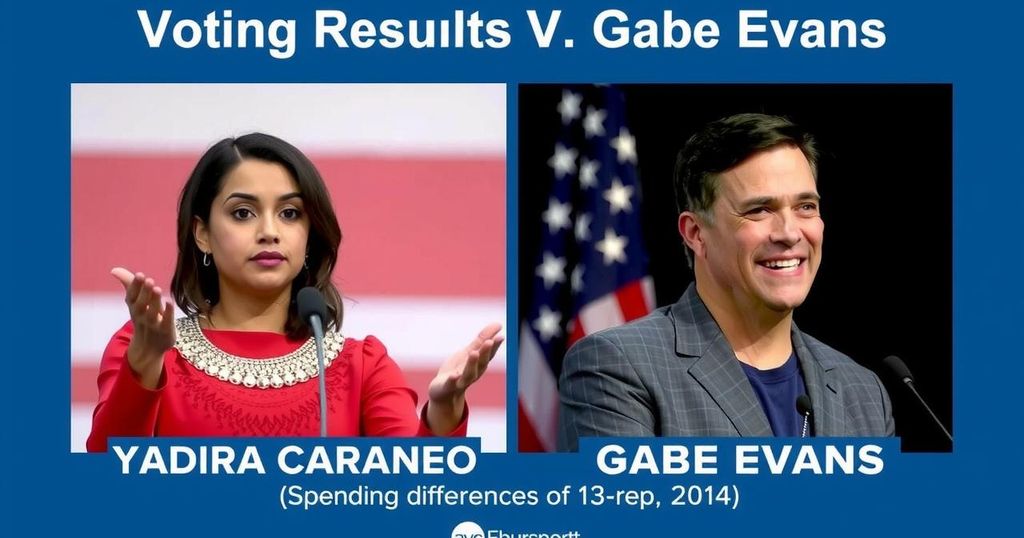Politics
8TH CONGRESSIONAL DISTRICT, ADAM FRISCH, BRAZIL, CARAVEO, COLORADO, DEMOCRAT, DENVER, ELECTION, ELECTIONS, FEDERAL ELECTION COMMISSION, GABE, GOP, LAUREN BOEBERT, LEGISLATION, NORTH AMERICA, OPENSECRETS. ORG, POLL RESULTS, PRESIDENTIAL CANDIDATES, PRESIDENTIAL ELECTION 2024, SOUTH AMERICA, UNITED STATES, WESTERN SLOPE, YADIRA CARAVEO
Fatima Khan
0 Comments
Financial Dynamics of Colorado’s Congressional Races: A Study in Spending and Voter Engagement
U.S. Rep. Yadira Caraveo lost to Gabe Evans, despite spending $151 per vote against his $96. The 8th District attracted $40 million in total expenditures, nearly half of Colorado’s total campaign spending. High funding did not guarantee victories, indicating the importance of candidate authenticity and messaging in connecting with voters.
U.S. Representative Yadira Caraveo faced defeat despite a per-vote expenditure of $151, which is considerably higher than the $96 spent by her opponent, Republican Gabe Evans. The recent election cycle saw over $80 million allocated across Colorado’s congressional races, with approximately half of that amount, $40 million, concentrated within the competitive 8th Congressional District, where Evans managed to win by a mere margin of less than 2,500 votes. The financial dominance was skewed towards Caraveo, who had her campaign invest over $8 million directly, alongside more than $16 million from outside groups.
Evans, conversely, invested about $2.5 million with an additional $13 million from outside sources; despite being substantially outspent, his relatable campaign message resonated with voters. The outcome signified a shift in Colorado’s congressional representation, now comprised of four Democrats and four Republicans, reflecting a Republican majority in Congress.
In other districts, significant financial activity impacted outcomes, although not uniformly. In the 3rd Congressional District, Democrat Adam Frisch’s previous attempt to unseat Republican Lauren Boebert resulted in a funding spike, allowing him to spend nearly $18 million to increase his competitiveness. In contrast, Boebert’s budget surpassed $5.6 million in her new district’s race, ensuring she did not fall behind in spending, given her position in a traditionally red region.
The financial landscape illustrated that while high spending is a factor in congressional races, the authenticity and message of candidates remain paramount to electoral success. Notably, despite extensive efforts from their teams, both Frisch and Boebert had varying results depending on the trust garnered from their constituencies. Evaluating the spending per vote across various districts reveals an intriguing correlation between investment and voter support, highlighting the complexities within campaign financing and voter behavior.
The article revolves around the significant financial expenditures in Colorado’s congressional races during the 2024 election cycle, highlighting the variance in campaign spending across different districts. The 8th Congressional District emerged as a focal point, attracting nearly half of the state’s total campaign spending, which included substantial contributions from outside groups. This context serves to underscore the impact of financial resources on the electoral process, implicating outcomes and underscoring the critical role of candidate relatability in a competitive political landscape.
In conclusion, the recent election cycle for Colorado’s congressional races illustrates a complex interplay between campaign financing and voter selection. Despite unparalleled spending by Yadira Caraveo, her loss to Gabe Evans indicates a crucial factor — the influence of candidate relatability and perceived authenticity among voters. This pattern continued to unfold across other districts, affirming the notion that well-funded campaigns do not guarantee electoral success without the candidate’s alignment with voter sentiments and expectations.
Original Source: www.denverpost.com




Post Comment